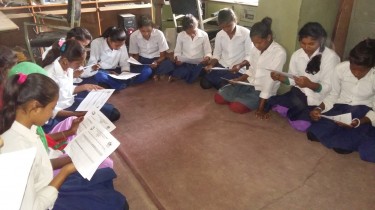Background
Menstrual hygiene management (MNH) challenges faced by girls in low-income countries are receiving increasing attention as a public health issue. It is difficult for girls to hygienically and confidently take care of themselves during menstruation when they have poor access to adequate WASH facilities or they cannot access appropriate sanitary materials because of financial or supply issues in rural areas. WaterAid, through its project ‘Ensuring girls’ rights through school and community-based WASH and improved menstrual hygiene management in Nepal and Pakistan, is contributing to the government of Nepal’s targets for child friendly schools and water and sanitation, and thereby aims to contribute towards gender equality in schools.
Objective
- Investigate and understand the scope of challenges faced by girls during menstruation (mainly at school but also in the community or household)
- Understand the determinants of those challenges, ad identify potential solutions and recommendations.
Methodology
This mixed method research was conducted in Sindhuli and Udaypur districts, where WaterAid has partnered with NEWAH to improve water and sanitation facilities and provide menstrual hygiene support programmes in government schools. For the quantitative aspect, structure interviews were conducted with girls as well as boy as WaterAID seeks to promote supportive behavior and increased awareness among all students. For the qualitative approach, group interviews with girls, focus group discussions with six to eight menstruating girls to discuss school and community issues in MHM and interviews with teachers and mothers were also conducted in order to triangulate information from girls.
Project Location
Similar Projects
Introduction This is a multi-country and multi-method study that aims to test the feasibility, cost and appropriateness of three novel ...
Background The project was conducted in coordination with Save the Children, American Red Cross and NSET. The project was conducted to ...
Background In line with the constitution of Nepal (2007) which enshrined health as the basic right of citizens, the Government of ...
Background Menstrual hygiene management (MNH) challenges faced by girls in low-income countries are receiving increasing attention as ...
INSPIRE2CARE PROGRAM – A comprehensive study of household, health facility and disability assessment
Background Good health and wellbeing is one of the key component for sustainable development. Due to concerted efforts from government ...
Background The WHO Violence and Injury Prevention Programme and the Global Alliance for Clean Cookstoves funded this pilot field test ...
Background HERD International undertook this study to assess the interventions of Karuna Foundation Nepal which focused on Education, ...
Shifting tasks to mid-level health workers has been recommended as an effective strategy to provide care in rural and remote areas ...
Central Bureau of Statistics (CBS), on behalf of Ministry of Federal Affairs and Local Development (MoFALD) and Ministry of Urban ...
